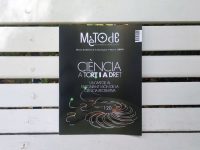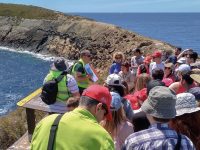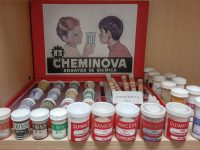
Illustration: Evie Shaffer
Etymology is one of those disciplines I am fascinated with: it fluidly combines the past and the present, and connects linguistic archaeology and everyday use. When I was studying, many science teachers strove to teach us new concepts by providing the origin of the scientific term. It was much easier to understand the new piece of knowledge that way, at least for me. Imagine a biology exam where you were asked what a chromosome’s telomere is; thanks to etymology, you could say that these are the regions at the ends of chromosomes, and you would be right! It is true that, as a teenager, my classmates and I did not appreciate it the way we do now.
Over time, I have forgotten many things, but this taste for etymology left a trace and, whenever I can, I use it as a resource in my lessons. So this text comes from a personal reflection on science communication and popularisation. This reflection was included in a short speech I delivered at the main hall of the University of Barcelona on the occasion of this year’s science dissemination award. What do we scientists do when we explain our own or others’ research? Do we communicate our research or do we popularise it?
I do not think there is an easy or universal answer. I understand not everyone is cut from the same cloth. We do not have the same skills or abilities. It is true that some scientists are not particularly interested in communicating their discoveries and do not make much effort to bring knowledge closer to society, but I believe that this attitude is disappearing more and more every day. In fact, all research projects, either public or private, require a level of «accountability», so we have to explain what we do. I think scientific communicators make a great effort to try to «translate» scientific discoveries into lay, everyday terms and explanations, but many scientists commit to that outreach effort as well. I will explain my point of view using etymology. Please follow me and reflect on it yourselves.
For me, communicating science (from Latin communicare, “to make common”) means sharing scientific results by involving readers, listeners, or whoever receives that information. Scientists communicate to their colleagues during a conference, but finding a website with the abstract of an institution’s research also constitutes scientific communication. A precise, condensed message is necessary, as is, if at all possible, some appealing visual aid. Scientific communication is like a cover letter for a research group, and that is not the same as popularising. According to my interpretation, popularising science (from Latin popularis, “belonging to common people”) involves bringing scientific facts or results closer to society in general terms. The message does not need to be particularly precise: we need to look for simpler, more common words, and even compare facts with everyday events to make them easier to understand. But when I am asked what I do when I write for the general media, I cannot say if I am communicating or popularising. I think I am actually disseminating knowledge (from Latin disseminare, “spreading seed” or “sowing”). Disseminating science… To me that seems to be a unique and beautiful concept. Perhaps because my family has a long farming history, I like the concept of sowing, of generating small seeds of knowledge that will one day, under optimal conditions, germinate and yield fruit. Perhaps because I also come from a family of poets and school teachers, I like to think that I can fill attentive minds with words; that I may be able to arouse the curiosity of those who ready to listen. If they let me choose, if I can choose, I prefer to continue disseminating.





